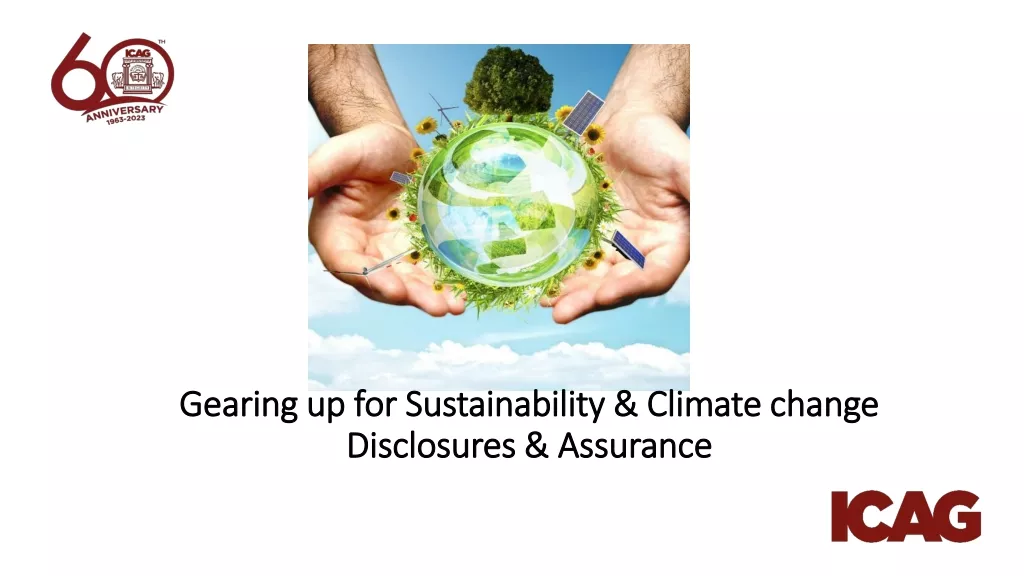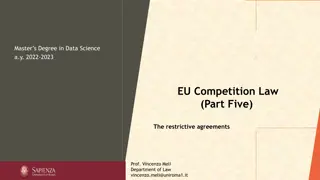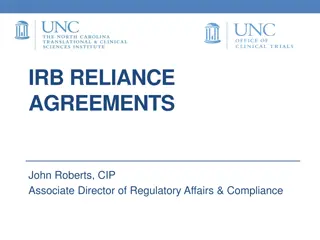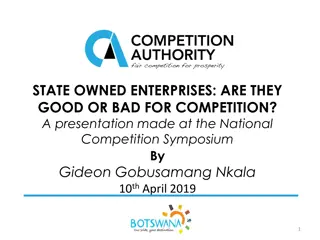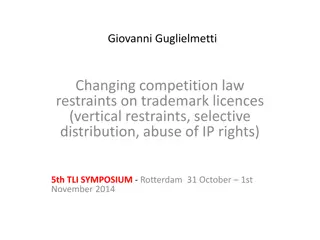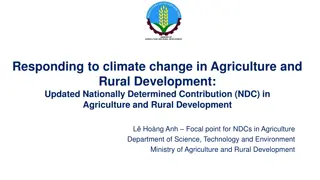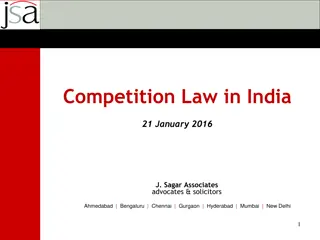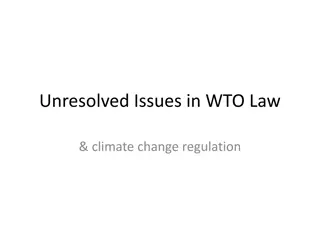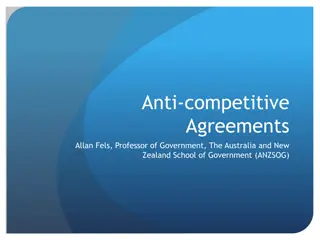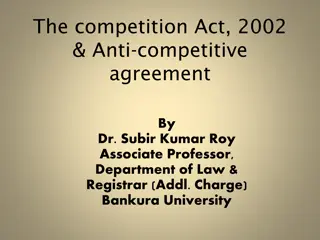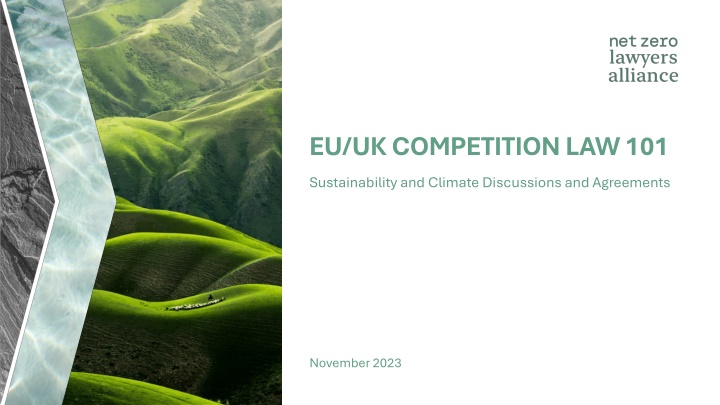
Sustainability and Climate Discussions in EU/UK Competition Law 101
Explore the intersection of sustainability goals and competition law in EU and UK, focusing on legitimate cooperation between competitors, prohibited agreements like greenwashing and cartels, and the importance of compliance with competition laws for sustainability initiatives. Learn how antitrust authorities support businesses in joint sustainability efforts while ensuring fair competition.
Download Presentation

Please find below an Image/Link to download the presentation.
The content on the website is provided AS IS for your information and personal use only. It may not be sold, licensed, or shared on other websites without obtaining consent from the author. If you encounter any issues during the download, it is possible that the publisher has removed the file from their server.
You are allowed to download the files provided on this website for personal or commercial use, subject to the condition that they are used lawfully. All files are the property of their respective owners.
The content on the website is provided AS IS for your information and personal use only. It may not be sold, licensed, or shared on other websites without obtaining consent from the author.
E N D
Presentation Transcript
EU/UK COMPETITION LAW 101 Sustainability and Climate Discussions and Agreements November 2023
Introduction Introduction Antitrust and sustainability agreements Antitrust and sustainability agreements Since the launch of the European Green Deal in 2019, businesses sustainability goals have become increasingly relevant for cooperation between competitors. Competition law regulates the competitive agreements between competitors being a key focus of competitive agreements between competitors being a key focus of enforcement. enforcement. regulates the behaviour behaviour of firms of firms in the market, with anti anti- - However, competition authorities have recognised their role in supporting businesses and providing greater certainty as to when competitor cooperation certainty as to when competitor cooperation on joint sustainability initiatives is permissible on joint sustainability initiatives is permissible, and when such cooperation goes too far and becomes illegal. Competition authorities like European Commission ( EC Competition and Markets Authority ( CMA ( ACM ACM ) have indicated a willingness to issue opinions on initiatives and willingness to issue opinions on initiatives and therefore protect the parties involved from enforcement action and fines therefore protect the parties involved from enforcement action and fines if they take advantage of this open open- -door policy. door policy. EC ), and the UK CMA )and the Duch Competition Authority US antitrust policy on Climate Change is politicized. US antitrust policy on Climate Change is politicized. There may be litigation on legitimate sustainability agreements, although these may eventually be cleared under a rule of reason. NZLA EU / UK COMPETITION LAW 101 SLIDE 2
Sustainability agreements Sustainability agreements What are they? What are they? Cooperation between competitors pursuing sustainability, biodiversity and climate goals, for example: Some agreements are clearly not compliant with clearly not compliant with competition law. competition law. improving water/air quality or eliminating pollution reducing greenhouse gas emissions, to fight climate change Some agreements require in in- -depth assessment and legal advice to ensure compliance with and legal advice to ensure compliance with competition law competition law e.g., conditions and considerations of economic efficiencies. depth assessment promoting the sustainable use of natural resources protecting biodiversity. This guide is based on the approach taken by the EC, ACM, and CMA. Important to note this presentation only provides broad genericadvice and each authority may take a slightly different view bespoke legal advice is recommended bespoke legal advice is recommended before restrictive agreements are implemented. before restrictive agreements are implemented. Some agreements are unlikely to infringe competition law. competition law. unlikely to infringe NZLA EU / UK COMPETITION LAW 101 SLIDE 3
Prohibited Greenwashing and Cartels Agreements that have as their object or effect a restriction of competition have as their object or effect a restriction of competition are harmful to competition and therefore prohibited. These include price-fixing, cartels, market or customer allocation, output restrictions, or limiting quality or innovation. Sustainability agreements that are used to disguise infringements of competition law used to disguise infringements of competition law are prohibited and authorities are not afraid to probe deeper not afraid to probe deeper to ensure goals are legitimate. are Limiting technology development; agreeing not to do better than minimum legal standards; or not to adopt a new less polluting production process. Collective boycott to exclude competitors from themarket, especially more sustainable competitors. Agreeing a price increase or surcharge to pass on costs of adopting sustainability initiatives. These may be by object infringements, unlikely to benefit from a sustainability exemption under competition law. unlikely to benefit from a sustainability exemption under competition law. Greenwashing Greenwashing likely to be pursued under consumer protection legislation. E.g. April 2024 EU Commission and 4 National Consumer Authorities sent letters to 20 airlines identifying several potentially misleading green claims suggesting that CO2 emissions caused by flights could be offset by climate projects or use of sustainable fuels, with consumers contributing with additional fees. NZLA EU / UK COMPETITION LAW 101 SLIDE 4
Unlikely to infringe antitrust law Agreements normally not restricting competition Agreements normally not restricting competition Agreements that do not negatively impact the parameters of competition ( do not negatively impact the parameters of competition (i.e. innovation). Examples: innovation). Examples: i.e., price, quantity, quality, functionality, choice, or , price, quantity, quality, functionality, choice, or Joint consumer campaigns; lobbying on sustainability issues; joint shareholder action to promote investee sustainability. Internal corporate initiatives, e.g. limiting single use plastic and printing in offices. Jointly funded industry training programmes on the reduction of greenhouse gas emissions. Early stage scientific or technological research that drawsupon parties complementary skills. Promise to comply with a precise and binding legal requirement; voluntary code of conduct. Development of a common methodology to calculate and report emissions impact. Agreements that go beyond these goals, or combine permissible examples with other aspects, may require legal advice and/or be prohibited. NZLA EU / UK COMPETITION LAW 101 SLIDE 5
Sustainability Standardisation Agreements Possibly qualifying for a soft safe harbour Possibly qualifying for a soft safe harbour Special rules apply to competitor agreements to create, adopt or comply with certain industry for sustainability: for sustainability: transparent transparent and relevant criteria accessible to all firms accessible to all firms on reasonable and non reasonable and non- -discriminatory create, adopt or comply with certain industry- -wide agreed minimum standards wide agreed minimum standards discriminatory terms. Not permissible to: prohibit prohibit competitors from applying alternative or higher standards oblige competitors to comply oblige competitors to comply with the standard, unless exempted (although monitoring and certifying those who have signed up voluntarily is permissible) use the standard for greenwashing greenwashing or misleading environmental claims. alternative or higher standards NB: The EC has further requirements for the safe harbour, e.g., on market share, procedure for adoption of objective and non-discriminatory criteria. Standards not complying with soft safe harbour criteria may still be exemptible. NZLA EU / UK COMPETITION LAW 101 SLIDE 6
Sharing Information Allowed if reasonably necessary for a permissible Allowed if reasonably necessary for a permissible sustainability goal sustainability goal Exchange of commercial information between competitors is typically a problem area under competition law. However, the authorities have recognised that pooling sustainability information can help further legitimate objectives. Discussions on price or purchase volumes. Pooling general information about the environmental credentials of suppliers, e.g., on (un)sustainable production processes/inputs/marketing practices. Information that goes beyond what is necessary and proportionate to develop a sustainability standard, or for joint sustainability lobbying. Sharing confidential commercially sensitive information between competitors requires great care, whether informally or Sharing confidential commercially sensitive information between competitors requires great care, whether informally or formally, including in a trade association setting. formally, including in a trade association setting. Safest is for the data to be collected by an independent 3 collected by an independent 3rd rd party party and only reported on an aggregated and historical aggregated and historical basis. NZLA EU / UK COMPETITION LAW 101 SLIDE 7
Other agreements and the sustainability exemption Requiring in Requiring in- -depth balancing of benefits and competitive impact depth balancing of benefits and competitive impact Initiatives that restrict competition may still be permissible if they benefit from the sustainability exemption: sustainability exemption: 1. Lead to objective benefit or efficiency gains objective benefit or efficiency gains that are capable of being substantiated, concrete and verifiable. environmental sustainability to, e.g., human rights, food waste and animal welfare. substantiated, concrete and verifiable. EC goes beyond 2. The restriction of competition must be indispensable equally effective, alternative. indispensable to attain the benefits or efficiency gains there must be no less restrictive, but 3. 3. Consumers affected by the agreement must receive a fair share of the benefits Consumers affected by the agreement must receive a fair share of the benefits, substantial enough to outweigh harm. Both individual and collective benefits may qualify. For climate agreements, benefits to all consumers may qualify. 4. The initiative does not eliminate effective competition does not eliminate effective competition for a substantial part of the products. Concepts and their application vary between each initiative and jurisdiction. vary between each initiative and jurisdiction. Sustainability justification must be robust and supported by economic data supported by economic data to ensure compliance. robust and NZLA EU / UK COMPETITION LAW 101 SLIDE 8
Sustainability agreements that may get exemption Exemption may be available even outside soft safe harbour Exemption may be available even outside soft safe harbour The following are examples of sustainability agreements are examples of sustainability agreements that require in-depth consideration to ensure compliance with competition law. Phase out, withdraw or replace non- sustainable products and processes, e.g., coal fired steel production, with sustainable alternatives. Agreements not to supply, support, finance or insure new fossil fuel projects, or to buyers that produce unsustainable products. Agreement to only purchase production inputs manufactured in a sustainable manner. Joint production or joint purchasing of sustainable input products between firms with high market share. Agreement to impose a minimum sustainability standard, e.g., recycled paper content in a magazine. Agreement imposing sustainability requirements fordistributors suppliers, and retailers. NZLA EU / UK COMPETITION LAW 101 SLIDE 9
Decision tree Use this tool to assess restrictions in climate/sustainability agreements under the exemption provision (Art 101(3) TFEU, Section 9 CA 1998) and the Rule of Reason (US) Agreement is not indispensable , and is therefore not allowed unless a Block Exemption Regulation applies, or agreement needed to create economy of scale or scope, to create synergies, to share prohibitive risk, or achieve goals more quickly or exceed them (see Guidelines) No market failure. Parties should compete on meeting demand for sustainable products Yes 1 Agreement does not generate procompetitive benefits that outweigh harm to competition 3 Are consumers sufficiently willing to pay for sustainability, or are regulations adequate? Apply rule of reason/exemption criteria. Do benefits outweigh competitive harm? Yes 2 balance (a) potential harm (market coverage); (b) benefits (e.g., better quality, standards, avoided costs, polluter pays principle); (c) no substantially less restrictive alternative? Does the agreement seek to address market failure? Do Parties pursue long-term spill-over benefits aligned with public policy? No Indicators are: nature of agreement/stated goal/public, open access/internal and documentary evidence/stakeholder involvement If parties pursue short-term profit: Collusion risk No Agreement unlikely to create procompetitive benefits that outweigh harm to competition Dolmans, Lin & Hollis, Sustainability and Net Zero Climate Agreements A Transatlantic Antitrust Perspective NZLA EU / UK COMPETITION LAW 101 SLIDE 10
Trade Association Meeting Guidelines Suggested disclaimer wording: Suggested disclaimer wording: Participants attending this meeting should be aware of their competition law obligations including with respect to the exchange or discussion of commercially sensitive information/topics. If there is any doubt as to application of these guidelines, participants should seek independent legal advice. DO DO NOT Discuss sustainability issues and how they impact the economy/your industry (but nothing confidential company-specific). Discuss, recommend or agree on the following matters: actual purchasing or selling prices, price trends, price changes and their implementation, methods of calculation, discounts, rebates or margins Discuss common problems and challenges of a general, administrative or logistical nature, as long as the purpose is not to encourage unjustified uniform action or the elimination or restriction of competition, for example in relation to prices, capacity, inputs or outputs. costs, including input costs, staff costs or trend data terms and conditions of purchase or sale or choice of suppliers and supplier categories, unless exemptible for sustainability objectives Share your opinion and general experience, as long as this does not result in sharing any detailed confidential sensitive businessinformation. levels of production and specific technological developments or changes that could have a competitive impact, unless exemptible for sustainability objectives Insist on an agenda for every meeting in advance; object if you see anything on the agenda that risks violating competition law (see red box). division or allocation of geographies or customer groups, sales volumes or market shares limitations on business methods or practices including those based on ethical or fair business practices, unless exemptible for sustainability objectives Terminate a discussion or leave a meeting if you consider there is a risk of violating competition law (see red box). Seek independent legal advice if you are at any time unsure of how to apply these rules. refusing to deal with particular customers or suppliers, unless exemptible for sustainability objectives. NZLA EU / UK COMPETITION LAW 101 SLIDE 14
Further information 1 EC Guidelines on the applicability of Article 101 of the Treaty on the Functioning of the European Union to horizontal co-operation agreements (21 July 2023) 2 ACM Second draft version: Guidelines on Sustainability Agreements Opportunities within competition law (26 January 2021) 3 UK CMA guidance on the application of the Chapter I prohibition in the Competition Act 1998 to environmental sustainability agreements (12 October 2023) 4 Dolmans, Lin and Hollis, Sustainability and Net Zero Climate Agreements A Transatlantic Antitrust Perspective (draft, CLPD, October 2023) 5 DLA Antitrust Matters August 2023 Competition and Sustainability a comprehensive review of national and supra-national regulation Lara Douvartzidis NZLA NZLA London Maurits Dolmans, Jackie Holland Cleary Gottlieb Steen & Hamilton LLP Cleary Gottlieb Steen & Hamilton LLP London/Brussels Contact: Contact: Alix Kamerling DLA Piper DLA Piper London/Brussels NZLA EU / UK COMPETITION LAW 101 SLIDE 15
Disclaimer Antitrust and sustainability agreements Antitrust and sustainability agreements This presentation is provided strictly on the basis that no reliance may be placed for any purpose on it or its accuracy, fairness or completeness. We do not assume any duty or lability in relation to the contents of the presentation. The presentation does not purport to be the full, accurate or complete information required to evaluate the individual circumstances where formal antitrust advice may be required. The presentation has not been reviewed or approved by any regulatory or supervisory authority. This presentation must not be disclosed, taken away, reproduced, redistributed, copied, modified, or passed on, directly or indirectly, to any other person outside of the NZLA membership, or published or used in whole or in part, for any purpose (except in whole, as is, with proper attribution, and with this disclaimer). Please note that the presentation is dated 1 November 2023 and that it is a statement of the law as of that date and not as of the date on which this consent is given. NZLA EU / UK COMPETITION LAW 101 SLIDE 16


